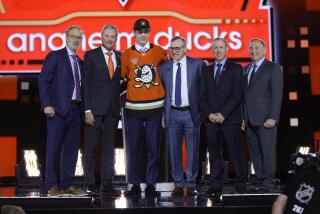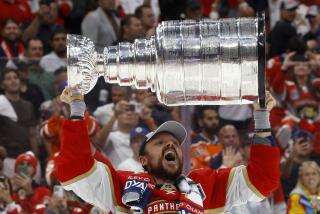Here Come the Sharks, Ready or Not
DALY CITY, Calif. — The San Jose Sharks are braced for the wild ride that comes with an inaugural season, the one that promises lots of high hopes, dubious distinctions, and many, many frustrating nights.
Don’t expect any Sharks to reach for any trash cans, but, judging from the years previous expansion teams have endured, there will be some times when they will play like they belong in one.
The NHL’s seventh expansion team -- not counting Winnipeg, Edmonton, Hartford and Quebec, which were World Hockey Association franchises before joining the league in 1979-80 -- in the last 21 years will be unique, nonetheless.
Thanks to a clause in George and Gordon Gund’s sale of the Minnesota North Stars, the Sharks plucked 24 young players from the North Stars organization, giving San Jose a nucleus of youth instead of the tired veterans that made up past expansion teams.
“I think the players San Jose got are on a better plateau than the old Washington Capitals or Kansas City Scouts got,” said Yvon Labre, a member of the original Washington Capitals who now works in the team’s front office. “They’re better-conditioned athletes. And with parity so close in the NHL, I don’t think it will take as long for San Jose to become respectible as it did with Kansas City or Washington.”
Regardless, the Sharks expect their share of moments worthy of the Vancouver Canucks or Buffalo Sabres of 1970-71, the Atlanta Flames or New York Islanders of 1972-73, or the Scouts or Capitals of 1974-75.
“The players have shown us a lot of enthusiasm,” said George Kingston, who gets his first NHL coaching job with the Sharks. “That enthusiasm, that optimism is very important because we know we have a lot of adversity to cut through this year.”
How bad can it get?
The ‘70-71 Sabres finished a respectible 24-39-15. However, a month into the season, they managed to be beaten 11-2 by the Montreal Canadiens, marking the only time in franchise history the Sabres have given up double-digit goals. The nine-goal margin of defeat has never been beaten, either.
The Canucks were almost as good that season, finishing 24-46-8. Still, on Feb. 25, 1971, they found a way to surrender the fastest three goals in NHL history -- the Boston Bruins scored three times in 20 seconds in the second period of an 8-3 loss.
“That year all the experts said we’d be lucky to win 15 games. We won 24 and we lost our captain (Orland Kurtenbach) after Christmas,” said Hal Laycoe, who coached the Canucks that season. “I don’t think people (in Vancouver) really appreciated what we did. ...
“You don’t have any depth. The biggest problem we had was winning on the road. We’d be playing a heck of a game and we’d give up three goals, bing, bing, bing. We didn’t have a player who could hold us together.”
The Islanders went through two coaches and finished 12-60-6 their first season. The lowpoint came on March 31, 1973, when they Isles gave up a then-NHL record eight goals in the second period of a 10-2 loss at Philadelphia.
In 1974-75, the Scouts finished 15-54-11, but were completely overshadowed by the misfortunes of the Capitals. With a record of 8-67-5, Washington set NHL records for fewest wins, fewest points and most losses in one season. The Capitals also managed to set NHL records for consecutive losses (17), consecutive road losses (37), consecutive home losses (11) and most goals allowed in a season (446).
“There were times we as players as a group got pretty depressed,” Labre said. “There are times people talk about winning snowballing; well the same thing happens when you get beat.
“I think we lost 16 games that season by one goal, so we played some pretty good hockey and were in some pretty good games. But to keep losing by one goal in the last minute or the last second sometimes that just made it worse.”
When the Capitals finally won a road game, beating the California Golden Seals 5-3 in their 38th try away from home, they knew how to celebrate.
Tommy Williams, the Capitals’ high scorer that season, had everybody on the team sign a garbage can with a magic marker before he carried it around the team’s dressing room, mimicking the annual celebration ritual enjoyed by a Stanley Cup champion.
“It was amazing. Here we were one of the most depressing teams and we were acting like we won the Stanley Cup ... just because we won one game,” Labre said.
At the other end of the expansion spectrum came the Flames, who went 25-38-15 in 1972-73, thanks to the goaltending tandem of Phil Myre and Dan Bouchard, who ranked seventh among 16 teams in goals-against.
Still, the Flames, who moved to Calgary in 1980, have not won as few games, amassed as few points, or scored as few goals in their 18 subsequent seasons.
Sharks general manager Jack Ferreira, who spent six seasons working in the Calgary organization as a scout, held up the Flames as the model he wants San Jose to emulate. He set out to build the Sharks from the goal out.
“That was our strategy, and we wanted to have a lot of youth (at goaltender and on defense),” Ferreira said. “Good goaltending and good defensemen are a priority in this league. We thought if we could load up in those areas that it would help us in the future.”
By picking up veteran Brian Hayward and talented Jeff Hackett, as well as signing Latvian goalie Artur Irbe, Ferreira has managed to put together a goaltending corps that is as good or better than many existing NHL teams.
On defense, veteran Doug Wilson, a six-time All-Star and former Norris Trophy winner, and his partner from the Chicago Blackhawks, Bob McGill, will serve as role models for a blueline corps that is young and talented.
Neil Wilkinson and Rob Zettler, who each played standout roles during the North Stars’ unexpected march into the Stanley Cup finals, will also be key figures. Minor leaguers Ken Hammond, Pat MacLeod, Jayson More and Rick Lessard will battle for playing time.
The Sharks are not expected to score much. They have veteran two-way forwards Kelly Kisio, Brian Mullen and Steve Bozek, but lack a big gunner.
If right wing Wayne Presley, acquired in a trade from Chicago two weeks ago, can find his 1986-87 scoring touch (32 goals, 29 assists), and former Olympian and New York Ranger Mark Pavelich can rekindle his skills after a two-year retirement, that should ease the offensive burden a bit.
“Two or three or four guys can’t carry this team,” Kisio said. “It’s got to be every guy doing his job. ... We’re going to win our share of games, but, naturally, it’s going to be tough. (The Smythe Division) is a tough division. Every team skates well. We’re going to have to play as a 19-20 man unit to win any games.”
The Sharks expect to take advantage of their home, the Cow Palace, which has an ice surface 15 feet shorter than regulation, right from the start.
“A smaller building is good for an expansion team,” Hayward said. “You can play a simple defensive game. ... You can block up more holes, and, with a small neutral zone you can hopefully negate some team speed on the other side.
“The Boston Garden is the same, and Buffalo and Chicago. Those teams are effective in their home rinks because they play a real simple game in their own end. They bang the puck around the boards, they work it out, and they dump it in, and they work to get it back. There’s no secret to that, and I think everybody realizes that we’re going to have to do that here to be successful.”
More to Read
Go beyond the scoreboard
Get the latest on L.A.'s teams in the daily Sports Report newsletter.
You may occasionally receive promotional content from the Los Angeles Times.






